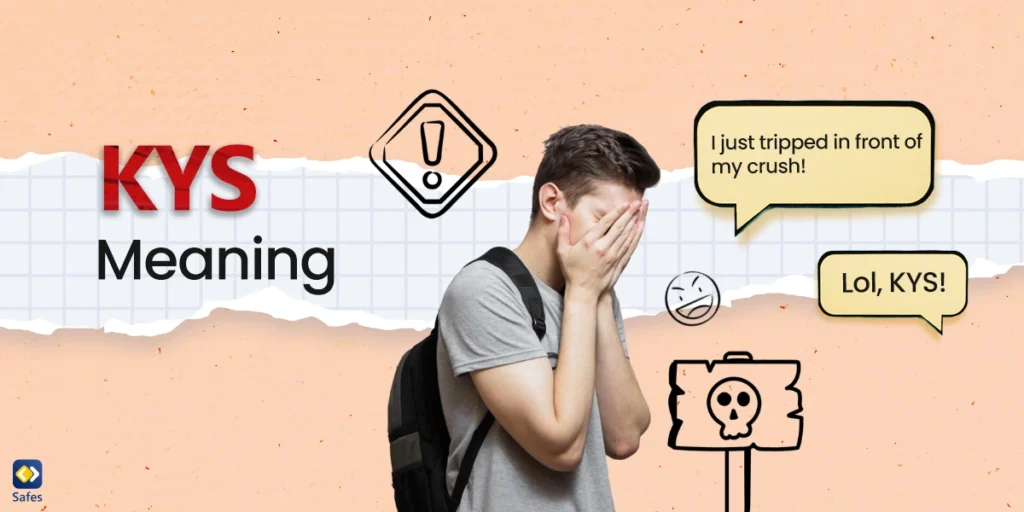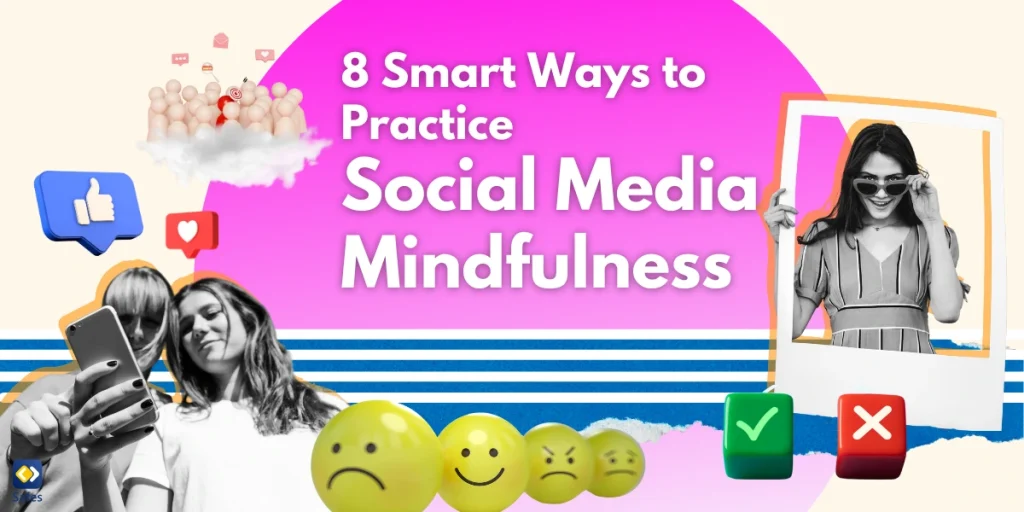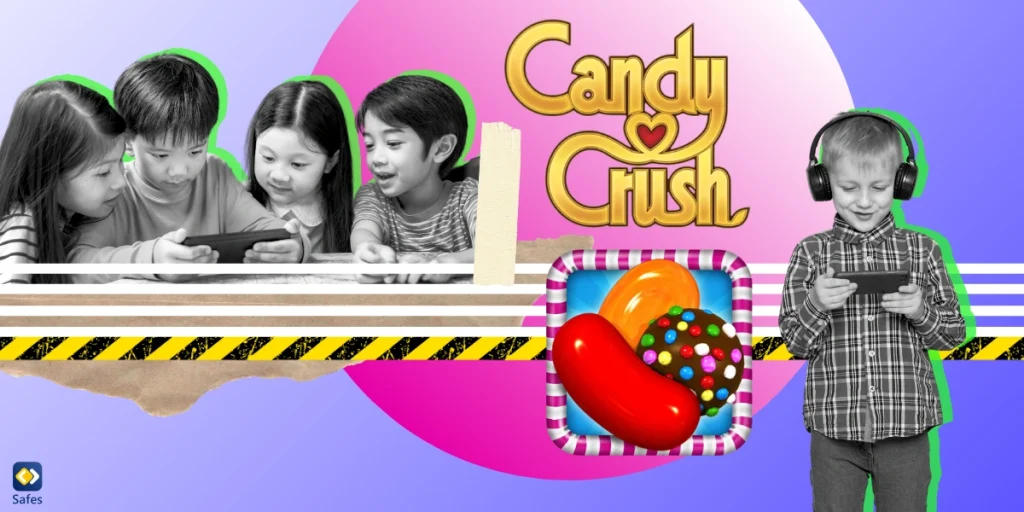In the fast‐evolving digital communication, understanding slang is more important than ever for parents who want to keep pace with their children’s online communication. In this post, “Meaning in 2025: Examples & Safety Tips” we explore what does KYS mean, how it’s used in text (including KYS meaning in text), and what does KYS mean on platforms like TikTok and Snapchat. By breaking down its definition, real-life usage, and the associated risks, we aim to empower parents with the knowledge they need to engage with their kids about online language safely and effectively.
Download and Start Your Free Trial of the Safes Parental Control App
Definition & Meaning (Short & Clear)
KYS is an acronym that traditionally stands for “kill yourself.” Originally emerging from online gaming communities and message boards in the early 2000s, this term has since spread widely across social media channels.
- Primary Definition: Kill Yourself – generally intended as a harsh insult or taunt.
- Alternative Meaning: In some contexts, it’s been reappropriated as a backronym for “keep yourself safe” to soften its impact, though this usage is less common.
- Variations & Spellings: Sometimes you might see it written in all capital letters (KYS) or in lowercase (KYS) depending on the tone and context.
It is important to note that while many young users might use this acronym casually, its inherent meaning can have severe emotional impacts if taken seriously.
How It’s Used in Real Digital Interactions
Understanding how slang like KYS shows up in day-to-day digital conversations is essential for recognizing its tone and impact. Whether it’s in texts, social media comments, or gaming chats, the context in which it appears can shift dramatically—from joking among friends to potentially harmful behavior. Below, we break down some of the most common ways teens and kids use this acronym online.
In Texts and Social Media
Teenagers often use slang like KYS in digital conversations—whether it’s in playful banter among friends or as part of more aggressive online exchanges. Here are a few examples:
Text Messages:
- Friend A: “I just tripped in front of my crush!”
- Friend B: “Lol, KYS!”
In this case, the term is used hyperbolically as a joke, though it can be misinterpreted.
Social Media Posts:
Some users might use KYS in a self-deprecating way after making a mistake, e.g., “Just failed my test… KYS, right?”
However, it’s crucial to ask: what does KYS mean in text—here, its usage can blur the line between humor and genuine distress.
In Gaming Communities
In online gaming chats, especially on platforms like Discord and Steam, KYS is frequently used after a misplay or mistake:
- A teammate might type “KYS, bro!” after an in-game error, which is meant as a tongue-in-cheek criticism among competitive players.
Tone Consideration: While the tone is often playful or sarcastic, it can sometimes come off as excessively harsh, especially when the recipient is already feeling vulnerable.

Platform-Specific Usage
The usage of KYS can differ depending on the platform. Let’s break down its behavior across some popular digital spaces:
TikTok
What does KYS mean on TikTok? On TikTok, KYS sometimes appears in video captions or comments.
- Usage: Often in reaction videos or memes, it’s used hyperbolically when someone fails at a challenge or makes an embarrassing mistake.
- Tone: Generally playful among peers, though occasionally it can border on cyberbullying.
- Trend: It is trending on TikTok as part of a larger repertoire of edgy humor, but many influencers and users are starting to call for more mindful language.
Snapchat
What does KYS mean in Snapchat? Snapchat users might incorporate KYS in quick, ephemeral messages.
- Usage: In the context of selfies or stories, it might be used self-referentially—e.g., after a bad day or a humorous mishap.
- Tone: The term can be casual; however, because snaps disappear quickly, its impact might be minimized—but that doesn’t reduce its potential for harm.
- Caution: Parents should be aware if they see this term being used repeatedly, as it might indicate underlying issues.
Discord & Gaming Chats
- Usage in Discord: In more competitive or casual gaming environments on Discord, KYS is sometimes thrown around as a part of aggressive banter.
- Tone: Often meant as a joke, but can escalate if the context shifts from teasing to harassment.
Instagram & Facebook
- Usage on Instagram and Facebook: Here, the term might be seen in comment sections or captions.
- Example: “I just made the biggest fail – KYS!”
- Tone: Depending on the user’s intent, it might be used to mock or belittle someone, making it more serious if taken literally.
What does KYS mean in text, what does KYS mean TikTok, and what does KYS mean in snapchat have all been addressed with tailored examples for each platform.
Risk Level Indicator (Parent Alert System)
🔴 Red – Potential Safety Concerns
When it comes to the usage of KYS, the term inherently carries a high risk. Even when used in jest, it trivializes serious issues like suicide and self-harm. As such, any appearance of KYS in your child’s digital communications should be considered a red flag.
- Emotional Impact: Even casual use can be harmful, especially for vulnerable teens.
- Cyberbullying: When used aggressively, it contributes to a toxic online environment and can exacerbate feelings of isolation.
- Mental Health: Repeated exposure to such language can negatively affect mental well-being.
Note: While some teens might claim it’s “just a joke,” the potential for harm is significant. It’s important for parents to address its usage immediately and have open conversations about the implications of such language.
Trend Tracker: Is It Still Relevant?
As of April 2025, here’s where KYS stands in the ever-changing world of teen slang:
🔥 Trending
- Among certain subcultures on platforms like TikTok and Discord, KYS remains prevalent as part of edgy humor.
Note: The assessment here is based on data collected from multiple online sources and user discussions across social media, ensuring that the judgement is current as of April 2025.
A Viral Example in Action: “The Epic Fail Video”
A recent TikTok video went viral where a popular teen influencer attempted a challenging dance routine. Mid-performance, they tripped and fell spectacularly. In the comments, a mix of supportive messages and harsh jibes emerged. One comment read, “Wow, KYS!” which quickly became a flashpoint in the discussion.
What happened?
The influencer’s fall was unexpected and initially met with laughter. However, the “KYS” comment quickly shifted the tone from playful teasing to something more concerning.
Reaction:
Many fans defended the influencer, urging those responsible to “keep it kind” and explaining that jokes about suicide are never acceptable.
Outcome:
The incident sparked a broader conversation on the dangers of using such acronyms in public forums. This case study underscores the delicate balance between humor and harmful language.
Key takeaway:
Even in a context where humor was intended, the line can be easily crossed, demonstrating why it is so important for parents and guardians to be proactive in discussing these issues.
Online Safety Considerations
While slang is often part of harmless peer communication, terms like KYS can carry more serious implications—especially when misused or misunderstood. It’s important for parents to understand the broader risks associated with this kind of language and how it may signal deeper issues. In the sections below, we’ll explore potential dangers and share practical steps parents can take to protect their children online.
While slang terms like KYS might seem like mere jokes to some teenagers, they can have far-reaching implications:
Cyberbullying:
Persistent use of KYS as a tool for harassment can contribute to an environment of cyberbullying. If a child is repeatedly exposed to this term, it might exacerbate feelings of isolation or depression.
Normalization of Harmful Language:
Casual or hyperbolic usage of phrases that reference self-harm or suicide can desensitize young users to the seriousness of these issues.
Mental Health Impacts:
For teenagers already struggling with mental health, reading or being sent KYS can act as a trigger or push them further into self-harm tendencies.
Secret Codes:
In some cases, harmful slang can evolve into secret codes used among peer groups, making it harder for parents to decipher and intervene.
Quick Advice for Parents
- Monitor Conversations: Use parental control apps and regularly check in with your child about their digital interactions.
- Open Communication: Have non-judgmental conversations about online language and what terms like KYS really mean.
- Educate and Empower: Inform your child about the potential harm behind certain words, encouraging empathy and self-care.
- Professional Support: If you notice signs of distress, consider professional counseling or seek support from school counselors.
Protecting Your Child with Safes Parental Control App
Before we conclude, we want to highlight our very own Safes parental control app. Safes is designed to help parents monitor their child’s online activity without intruding too deeply into their privacy. Here’s how Safes can assist you:
- Real-Time Alerts: Receive notifications when concerning keywords like “KYS” appear in your child’s texts, emails, or social media posts.
- Contextual Analysis: Unlike basic keyword filters, Safes uses contextual analysis to determine whether a term is used jokingly or harmfully.
- Customizable Controls: Set usage limits, block certain apps or websites, and review daily or weekly reports to keep track of your child’s digital habits.
- User-Friendly Interface: Easily accessible on both Android and iOS, making it simple to integrate into your daily parenting routine.
By using Safes, you can proactively protect your child from potential online risks and ensure they are safe while still enjoying the freedom of digital communication. We invite you to try Safes’s free trial—download it today on your Android or iOS device and experience peace of mind.
Conclusion
In summary, while KYS is just one of many acronyms circulating in teen slang, its impact is significant. Whether you’re asking, “what does KYS mean” or wondering about its usage in different contexts (like KYS meaning in text, what does KYS mean on TikTok, or what does KYS mean on Snapchat), it’s clear that language matters. What might seem like a harmless joke can quickly turn into a serious issue if used inappropriately.
As parents, staying informed about the latest slang and digital behaviors is crucial for creating a supportive and safe online environment for our children. By understanding the nuances and risks associated with terms like KYS, we can foster open dialogue and guide our kids toward healthier communication practices.
Remember, the digital world is complex, and words can have a powerful impact. Encourage empathy, be proactive in monitoring online interactions, and consider using tools like the Safes parental control app to help keep your child safe. Let’s work together to create a kinder, more thoughtful digital community.
Your Child’s Online Safety Starts Here
Every parent today needs a solution to manage screen time and keep their child safe online.
Without the right tools, digital risks and excessive screen time can impact children's well-being. Safes helps parents set healthy boundaries, monitor activity, and protect kids from online dangers—all with an easy-to-use app.
Take control of your child’s digital world. Learn more about Safes or download the app to start your free trial today!




